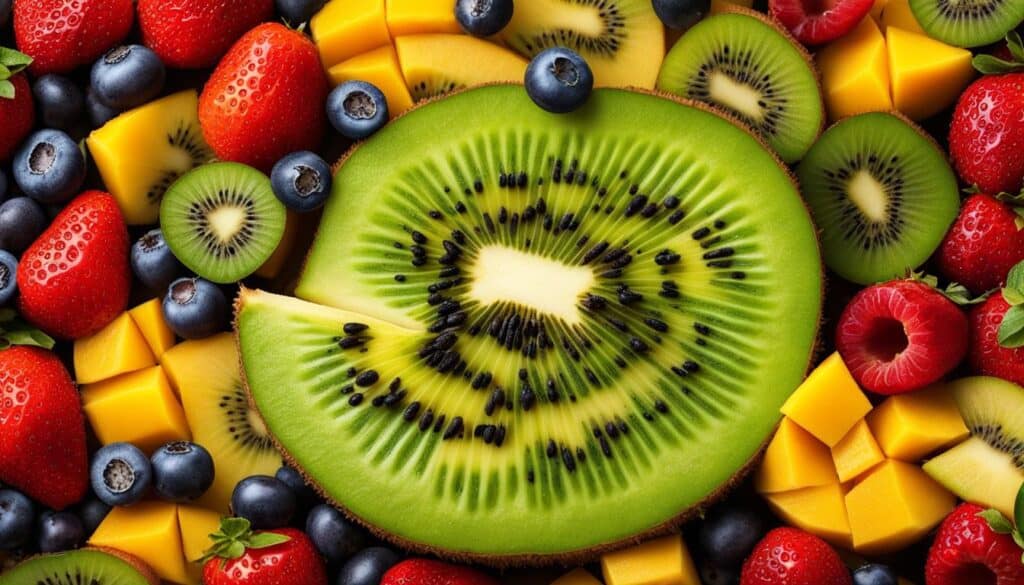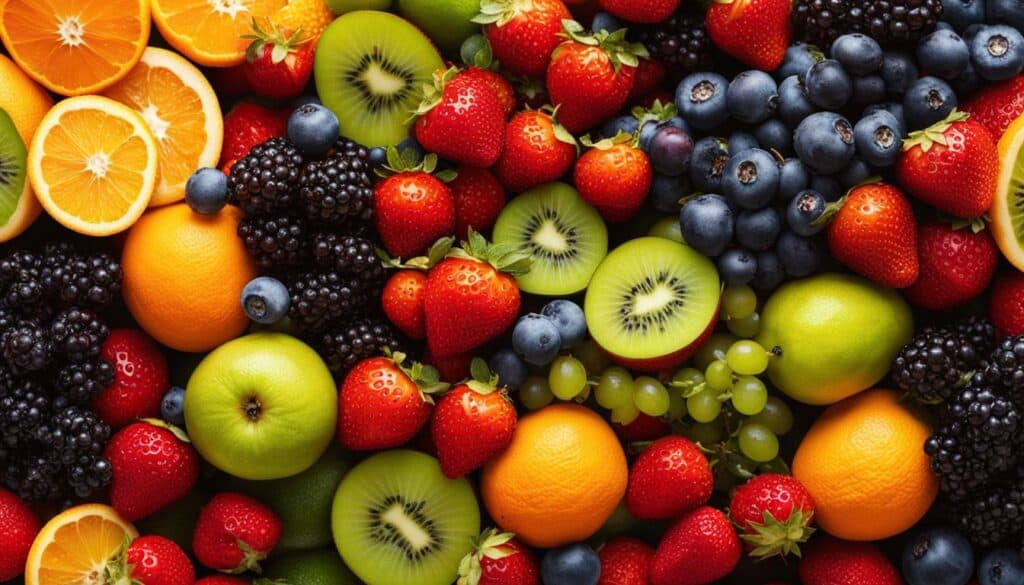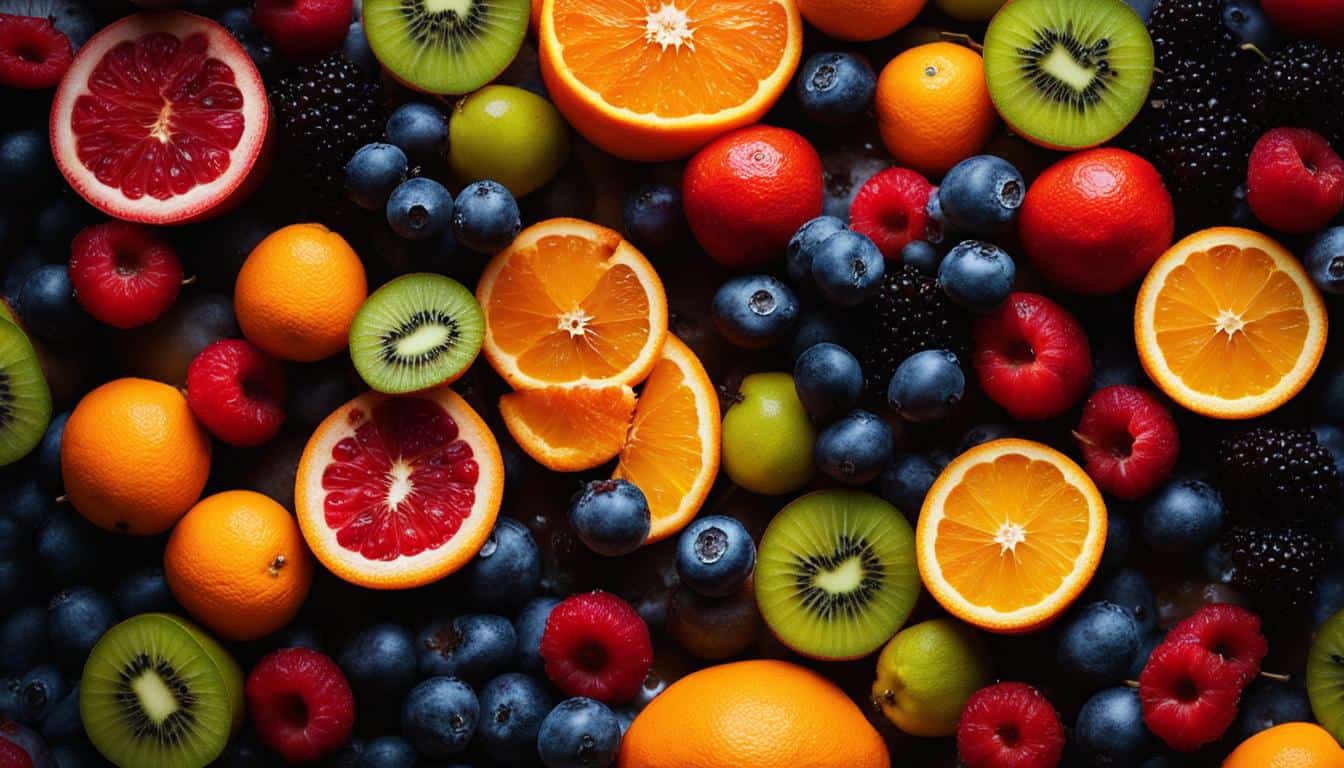Research has shown that certain nutrients can help maintain optimal eye health and improve eyesight naturally. By incorporating specific fruits into your diet, you can give your eyes the care they need. Let’s explore the best fruit for eyes and nature’s vision boosters.
Key Takeaways:
- Incorporating specific fruits into your diet can help maintain optimal eye health and improve eyesight naturally.
- Vitamin C, found in citrus fruits like oranges and grapefruits, is essential for maintaining healthy eyes and protecting against eye diseases.
- Vitamin E, found in avocados and almonds, has antioxidant properties that can help protect the eyes from damage.
- Lutein and zeaxanthin, found in leafy green vegetables like spinach and kale, play a crucial role in maintaining good eyesight.
- Anthocyanins, found in fruits like blueberries and black currants, are potent antioxidants linked to improved eye health.
The Benefits of Vitamin C for Eye Health
Vitamin C plays a crucial role in maintaining healthy eyes and promoting eye health. This essential nutrient offers a wide range of benefits when it comes to the well-being of our eyes. Studies have shown that vitamin C can reduce the risk of age-related macular degeneration (AMD), a leading cause of vision loss. By incorporating foods rich in vitamin C into your diet, you can support your eye health and improve your overall vision.
Citrus fruits such as oranges, grapefruits, and lemons are excellent sources of vitamin C. These juicy and refreshing fruits not only provide a burst of flavor but also deliver a powerful dose of this essential nutrient. By enjoying citrus fruits regularly, you can enhance the health of your eyes and protect against the development of eye diseases.
Additionally, vitamin C acts as an antioxidant, helping to protect the eyes from harmful free radicals. These unstable molecules can cause oxidative stress and damage to the cells of the eye. By consuming vitamin C-rich foods, you can neutralize these free radicals and support the long-term health of your eyes.
The Benefits of Vitamin C for Eye Health
| Fruit | Vitamin C Content (per 100g) |
|---|---|
| Oranges | 53.2mg |
| Grapefruits | 31.2mg |
| Lemons | 53mg |
As shown in the table above, citrus fruits are a rich source of vitamin C, with oranges containing approximately 53.2mg per 100g serving. By incorporating these fruits into your daily diet, you can ensure that your eyes receive the necessary nutrients for optimal health.
In conclusion, vitamin C is an essential nutrient for maintaining healthy eyes. By consuming vitamin C-rich foods such as citrus fruits, you can support your eye health and improve your overall vision. Remember to include a variety of fruits in your diet to ensure you receive a wide range of vitamins and minerals beneficial for your eyes.
The Power of Vitamin E for Eye Protection
When it comes to taking care of your eyes, vitamin E plays a crucial role in providing protection against damage caused by free radicals. This powerful antioxidant can help maintain healthy eyes and reduce the risk of eye diseases. One of the best ways to ensure you’re getting enough vitamin E is by incorporating eye-friendly fruits into your diet.

Fruits such as avocados, almonds, and sunflower seeds are rich sources of vitamin E. Including these delicious treats in your meals can contribute to maintaining healthy eyes and supporting your overall eye health. Vitamin E works by neutralizing free radicals that can cause oxidative stress and damage to the eyes.
By incorporating vitamin E-rich fruits into your diet, you can provide natural eye care and protect your eyes from the harmful effects of aging and environmental factors. The antioxidant properties of vitamin E help keep your eyes healthy and functioning optimally, allowing you to maintain clear vision and reduce the risk of eye-related issues.
Additional Benefits of Vitamin E:
- Helps reduce the risk of cataracts
- Supports the health of blood vessels in the eyes
- Improves dry eye symptoms
- Promotes overall eye health and function
Make sure to consult with your healthcare professional before making any significant changes to your diet or starting any new supplements. They can provide personalized advice based on your individual needs and help you incorporate the best fruits for eyes into your diet for natural eye care.
Lutein and Zeaxanthin: The Dynamic Duo for Eye Health
Lutein and zeaxanthin are two important carotenoids that play a crucial role in maintaining good eyesight and promoting overall eye health. These powerful antioxidants are known for their ability to filter harmful blue light and protect the eyes from oxidative stress, which can contribute to the development of age-related eye diseases.
Leafy green vegetables, such as spinach and kale, are excellent sources of lutein and zeaxanthin. These vibrant greens not only add color and flavor to your meals but also provide essential nutrients for healthy eyes. Additionally, fruits like broccoli and peas also contain significant amounts of lutein and zeaxanthin to support optimal eye function.
While lutein and zeaxanthin can be obtained through diet, some individuals may benefit from supplements to ensure they are getting enough of these eye-healthy nutrients. Consult with your healthcare professional to determine if supplementation is necessary for your specific needs.
| Fruit and Vegetable | Lutein Content (mcg per 100g) | Zeaxanthin Content (mcg per 100g) |
|---|---|---|
| Spinach | 12,198 | 5,715 |
| Kale | 11,400 | 3,200 |
| Broccoli | 1,750 | 1,000 |
| Peas | 135 | 247 |
Table: Lutein and Zeaxanthin Content in Fruits and Vegetables
The Antioxidant Richness of Anthocyanins
Anthocyanins, a type of pigment found in various fruits, are known for their potent antioxidant properties that can contribute to maintaining healthy vision. These natural compounds have been linked to vision improvement and overall eye health.
One of the benefits of anthocyanins is their ability to help prevent age-related macular degeneration (AMD), a progressive eye disease that can lead to vision loss. Studies suggest that anthocyanins protect the retina from oxidative stress and reduce inflammation, which are key factors in the development and progression of AMD.
Research has also shown that anthocyanins play a role in supporting the health of the blood vessels in the eyes. By strengthening the blood vessels and improving blood flow, these antioxidants can promote overall eye wellness and reduce the risk of conditions such as diabetic retinopathy.
The Benefits of Anthocyanin-Rich Fruits
Several fruits are rich sources of anthocyanins, making them excellent choices for promoting eye health and vision improvement. Some of the top fruits to include in your diet for their anthocyanin content include:
- Blueberries: These small, flavorful berries are packed with anthocyanins, making them one of the best fruits for eye health.
- Bilberries: Similar to blueberries, bilberries are known for their high anthocyanin content and have long been used for promoting healthy vision.
- Black currants: These tart berries are not only rich in anthocyanins but also contain other beneficial nutrients like vitamin C and vitamin E.
Incorporating these anthocyanin-rich fruits into your diet can be as simple as enjoying them as a snack, adding them to smoothies or oatmeal, or using them in baked goods like muffins or pancakes.
Conclusion
Anthocyanins, the pigments responsible for the vibrant colors of certain fruits, offer a range of benefits for eye health and vision improvement. Including anthocyanin-rich fruits like blueberries, bilberries, and black currants in your diet can help support the health of your eyes and reduce the risk of age-related eye conditions. By harnessing the power of these antioxidants, you can take proactive steps towards maintaining healthy vision naturally.
The Importance of Omega-3 Fatty Acids for Eye Health
Omega-3 fatty acids are essential for maintaining good eye health and improving eyesight naturally. These healthy fats provide numerous benefits for the eyes, including reducing the risk of dry eyes and age-related macular degeneration (AMD). Incorporating omega-3-rich foods into your diet or taking supplements can help support your overall eye care routine.
Research has shown that omega-3 fatty acids play a crucial role in preventing dry eyes by reducing inflammation and improving tear production. Dry eyes can cause discomfort, irritation, and blurry vision. By increasing omega-3 intake, you can help alleviate these symptoms and promote healthy tear production.
Moreover, omega-3 fatty acids have been linked to a reduced risk of AMD, a condition that affects the central part of the retina, leading to vision loss. These essential fats help protect the macula from damage caused by oxidation and inflammation, preserving central vision.
Omega-3 fatty acids have been found to promote eye health and improve eyesight naturally. Adding omega-3-rich foods like salmon and tuna to your diet or taking fish oil supplements can help protect against dry eyes and age-related macular degeneration.
The Benefits of Omega-3 Fatty Acids for Eye Health
Omega-3 fatty acids provide several benefits for eye health:
- Reduced risk of dry eyes
- Protection against age-related macular degeneration
- Anti-inflammatory properties to support overall eye health
- Promotion of optimal tear production
When it comes to incorporating omega-3 fatty acids into your diet, cold-water fish like salmon, tuna, and sardines are excellent sources. Aim to consume fatty fish at least twice a week to ensure an adequate intake of omega-3s. If you don’t consume seafood, fish oil supplements or vegetarian alternatives like flaxseed oil can provide the same benefits.
| Fish Species | Omega-3 Fatty Acid Content (per 3 ounces) |
|---|---|
| Salmon (wild-caught) | 1.22 grams |
| Tuna (canned) | 0.73 grams |
| Sardines (canned) | 0.74 grams |
Remember, before starting any dietary supplements, it’s crucial to consult with your doctor, especially if you’re pregnant, nursing, or taking medication. They can provide personalized recommendations based on your specific needs and help ensure the proper dosage and safety of supplementation.

Zinc for Eye Health and Function
Zinc is an essential mineral that plays a vital role in eye health and function. It is involved in various processes, including the metabolism of important eye nutrients like vitamin A and antioxidant enzymes that protect the eyes from oxidative stress. Incorporating foods rich in zinc into your diet can help support healthy eyes and maintain optimal vision.
Some of the best food sources of zinc include:
- Beef: Lean cuts of beef are not only a great source of protein but also provide zinc, making it a nutritious choice for overall eye health.
- Legumes: Foods like chickpeas, lentils, and beans are not only rich in plant-based protein but also contain zinc, making them a healthy addition to your diet.
- Nuts: Almonds, cashews, and peanuts are nutritious snacks that also provide zinc, offering a tasty way to support your eye health.
It’s important to note that zinc absorption can be influenced by other dietary factors and individual differences. For example, phytates, which are found in some plant-based foods, can reduce zinc absorption. On the other hand, consuming foods high in vitamin C alongside zinc-rich foods can enhance zinc absorption. If you’re concerned about your zinc intake or have specific dietary restrictions, it’s best to consult with a healthcare professional for personalized advice.
| Foods High in Zinc | Zinc Content (per 100g) |
|---|---|
| Beef (lean) | 5.30mg |
| Lentils (cooked) | 1.30mg |
| Almonds | 3.30mg |
| Cashews | 5.60mg |
| Peanuts | 3.27mg |
The Role of Zinc in Eye Health
Zinc is essential for maintaining the health and function of various structures in the eyes. It helps support the formation of pigment in the retina, which is crucial for good vision. Additionally, zinc plays a role in maintaining the integrity of the eye tissues, including the cornea and lens. Adequate zinc levels have been associated with a reduced risk of age-related macular degeneration (AMD) and cataracts, two common eye conditions that can lead to vision loss.
“Zinc is an important mineral for maintaining the health and function of the eyes. Including zinc-rich foods in your diet can help support optimal eye health and protect against eye diseases.”
Incorporating zinc-rich foods into your diet, along with a balanced and nutritious eating plan, is an excellent way to support your overall eye health. Remember to consult with a healthcare professional or registered dietitian for personalized advice on meeting your specific dietary needs.

Including the Best Fruits for Eyes in Your Diet
When it comes to maintaining healthy eyes and improving eyesight naturally, incorporating the best fruit for eyes into your diet is essential. These fruits are packed with vitamins, antioxidants, and essential nutrients that can support eye health and protect against eye diseases. Here are some of the top fruits you should consider adding to your meals:
- Citrus fruits: Oranges, grapefruits, and lemons are rich in vitamin C, which is known to promote eye health and protect against age-related macular degeneration.
- Leafy greens: Spinach and kale are excellent sources of lutein and zeaxanthin, which are crucial for maintaining good eyesight and protecting against oxidative stress.
- Eggs: Eggs contain lutein, zeaxanthin, and zinc, all of which contribute to healthy eyes and better vision.
- Whole grains: Whole grains like brown rice and quinoa are rich in vitamin E, zinc, and niacin, which are beneficial for eye health.
- Berries: Blueberries, strawberries, and blackberries are packed with antioxidants like anthocyanins, which can improve vision and overall eye health.
By including these fruits in your diet, you can ensure that your eyes receive the necessary nutrients to maintain their health and improve eyesight naturally. Remember to consult with your doctor or healthcare professional before making any significant changes to your diet, especially if you have any existing medical conditions or are taking medications.

Image source:
Supplementing for Eye Health
While maintaining a balanced diet is essential for good eye health, there are instances where supplements can provide additional support. It is important to note that before starting any dietary supplements, especially if you are pregnant, nursing, or taking medication, you should consult with your doctor or healthcare professional.
Supplements such as fish oil, lutein, and zeaxanthin can be beneficial in promoting eye health and natural eye care. Fish oil, rich in omega-3 fatty acids, has been shown to reduce the risk of dry eyes and age-related macular degeneration. Lutein and zeaxanthin, on the other hand, are carotenoids that play a crucial role in maintaining good eyesight. They help filter harmful blue light and protect the eyes from oxidative stress.
To effectively supplement for eye health, it is important to choose high-quality supplements from reputable sources. Look for supplements that are third-party tested for purity and potency. Additionally, ensure that the supplements you choose contain the appropriate dosage as recommended by healthcare professionals.
Supplementing for Eye Health
| Supplement | Benefits | Food Sources |
|---|---|---|
| Fish Oil | Reduces the risk of dry eyes and age-related macular degeneration | Fatty fish (salmon, tuna, sardines) or fish oil supplements |
| Lutein | Protects the eyes from oxidative stress and improves vision | Leafy greens (spinach, kale), broccoli, peas |
| Zeaxanthin | Filters harmful blue light and supports overall eye health | Leafy greens (spinach, kale), broccoli, peas |
Remember, supplements should complement a healthy lifestyle and balanced diet, not replace them. It is important to prioritize a nutrient-rich diet and consult with healthcare professionals to determine the best approach for your specific eye health needs.
By incorporating supplements into your routine alongside a nutritious diet, you can provide your eyes with the necessary support for optimal eye health and vision improvement. However, it is crucial to remember that supplements should never replace a healthy lifestyle. Regular eye examinations, proper eye care practices, and protecting your eyes from harmful factors such as blue light are equally vital for maintaining healthy eyes.

The Importance of a Healthy Lifestyle for Eye Care
When it comes to taking care of your eyes, adopting a healthy lifestyle is just as important as incorporating the best fruits for eye health into your diet. A holistic approach to eye care involves practices that support overall well-being, promote optimal vision, and protect against common eye conditions.
The Role of Exercise
Regular exercise plays a vital role in maintaining healthy eyes. Engaging in physical activity improves blood circulation throughout the body, including the eyes. It helps deliver essential nutrients and oxygen to the eyes, promoting eye health and reducing the risk of eye diseases. Aim for a combination of cardiovascular exercises, strength training, and eye exercises to maintain good eye health.
Say No to Smoking
Smoking is detrimental to eye health and can increase the risk of developing eye conditions such as cataracts, age-related macular degeneration (AMD), and optic nerve damage. The harmful chemicals in tobacco smoke can cause oxidative stress and reduce the antioxidants necessary to protect the eyes. Quitting smoking or avoiding exposure to secondhand smoke is crucial for maintaining healthy eyes.
Protecting from Blue Light
With increased screen time and exposure to digital devices, protecting your eyes from harmful blue light has become essential. Blue light exposure can lead to digital eye strain, fatigue, and potential long-term damage. Wearing blue light blocking glasses, reducing screen time, and implementing the 20-20-20 rule (taking a 20-second break every 20 minutes to look at an object 20 feet away) can help protect your eyes from digital strain.
Wearing Sunglasses
The sun’s ultraviolet (UV) rays can cause damage to the eyes, leading to conditions such as cataracts, macular degeneration, and photokeratitis. Wearing sunglasses that block 100% of UVA and UVB rays helps protect the eyes from harmful UV exposure. Look for sunglasses labeled with UV protection and wear them whenever you are outdoors, even on cloudy days.
By adopting a healthy lifestyle that includes regular exercise, avoiding smoking, protecting your eyes from blue light, and wearing sunglasses, you can take proactive steps to maintain healthy eyes and promote optimal vision. Combined with a balanced diet rich in eye-friendly fruits and nutrients, these lifestyle choices contribute to comprehensive eye care and natural eye maintenance.
Conclusion
Maintaining good eye health and improving eyesight naturally is crucial for overall well-being. By incorporating the best fruit for eyes into your diet, you can take a proactive approach to natural eye care. Fruits rich in vitamins, antioxidants, and essential nutrients can support your eye health and protect against eye diseases and vision deterioration.
Remember, it’s always a good idea to consult with your doctor or healthcare professional before making any significant changes to your diet or starting any new supplements. They can provide personalized recommendations based on your specific needs and medical history.
Additionally, don’t forget about the importance of a healthy lifestyle in maintaining optimal eye health. Regular exercise, quitting smoking, wearing sunglasses, and protecting your eyes from blue light are all simple yet effective ways to care for your eyes.
By prioritizing natural eye care and incorporating the best fruit for eyes into your daily routine, you can take proactive steps towards improving and maintaining your eye health for years to come.
FAQ
Can eating specific fruits improve eye health and eyesight naturally?
Yes, research has shown that certain fruits are rich in nutrients that can help maintain optimal eye health and improve eyesight naturally.
Which fruits are rich in vitamin C and good for eye health?
Citrus fruits like oranges, grapefruits, and lemons are rich in vitamin C and can help promote eye health.
What is the benefit of vitamin E for eye protection?
Vitamin E has antioxidant properties that can help protect the eyes from damage caused by free radicals.
Which fruits are high in vitamin E and beneficial for eye health?
Fruits like avocados, almonds, and sunflower seeds are high in vitamin E and can contribute to maintaining healthy eyes.
What are lutein and zeaxanthin, and why are they important for eye health?
Lutein and zeaxanthin are carotenoids that play a crucial role in maintaining good eyesight by filtering harmful blue light and protecting the eyes from oxidative stress.
Which fruits are good sources of lutein and zeaxanthin?
Leafy green vegetables such as spinach and kale, as well as fruits like broccoli and peas, are excellent sources of these eye-healthy nutrients.
What are anthocyanins, and how do they contribute to eye health?
Anthocyanins are potent antioxidants that have been linked to improved eye health and can be found in fruits like blueberries, bilberries, and black currants.
How do omega-3 fatty acids benefit eye health?
Omega-3 fatty acids have been shown to reduce the risk of dry eyes and age-related macular degeneration.
Which foods are high in omega-3 fatty acids and beneficial for eye health?
Cold-water fish such as salmon, tuna, and sardines are excellent sources of omega-3s. Fish oil supplements or vegetarian alternatives like flaxseed oil can also provide the same benefits.
What role does zinc play in eye health?
Zinc is an essential mineral that plays a vital role in eye health and function, including the absorption of vitamin A, which is crucial for good vision.
Which foods are high in zinc and can contribute to maintaining healthy eyes?
Foods high in zinc include beef, legumes, and nuts and can help support eye health.
How can I incorporate the best fruits for eye health into my diet?
Consider adding citrus fruits, leafy greens, eggs, whole grains, and berries to your meals to ensure you are consuming fruits rich in eye-healthy nutrients.
Are supplements beneficial for eye health?
Supplements like fish oil, lutein, and zeaxanthin can provide additional support for eye health. However, it’s essential to consult with your doctor or healthcare professional before starting any new dietary supplement.
What lifestyle factors can contribute to maintaining healthy eyes?
Regular exercise, quitting smoking, wearing sunglasses, and protecting your eyes from blue light are all important for maintaining healthy eyes.





Leave a Reply